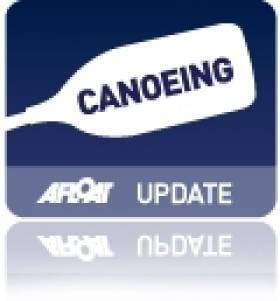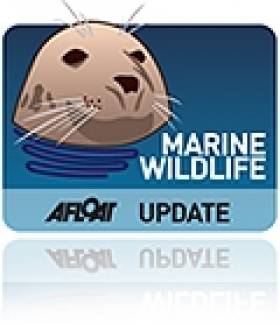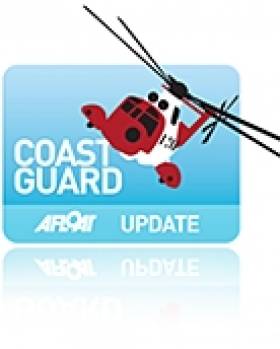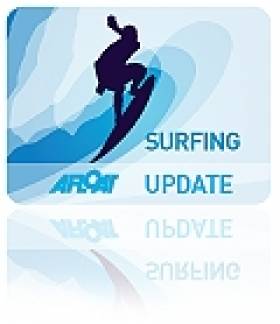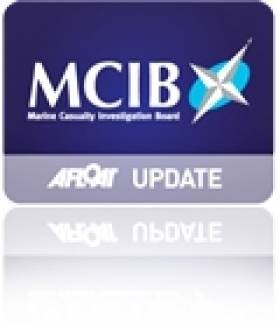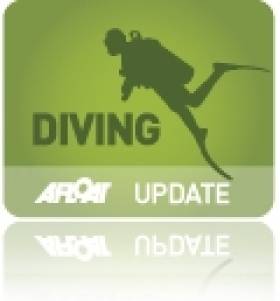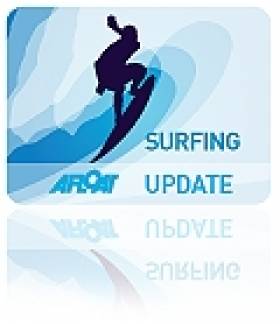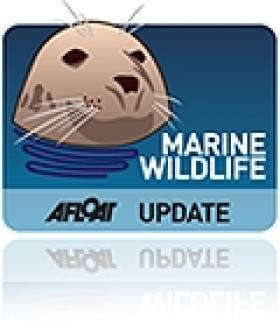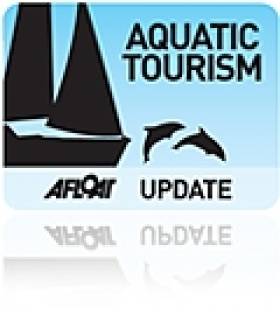Displaying items by tag: Co Donegal
Donegal Man Runs, Cycles, Swims and Kayaks Across Ireland for Charity
#KAYAKING - A fitness instructor from Donegal recently raised funds for a Parkinson's charity by crossing the north of Ireland from east to west with an extraordinary combination of running, cycling, swimming and kayaking.
As the Donegal Democrat reports, James McIntyre spent a weekend traversing the island of Ireland from Newcastle in Co down to Creevy in Co Donegal.
His route that included a mountain run across Sliabh Donard and the Mournes and a cycling portion from Annalong to Enniskillen, before he took to the water for a 35km kayak run along the length of Lower Lough Erne to Beleek and a swim across Assaroe Lake.
McIntyre covered 201km altogether in his epic challenge to raise funds for research into Parkinson's disease, an illness that affected both his and his partner's grandfathers.
The 37-year-old surf lifesaver is no stranger to such efforts, after completing an open sea swim of Donegal Bay last year, also for charity.
The Donegal Democrat has much more on the story HERE.
Whales, Dolphin Found Beached on West Coast
#MARINE WILDLIFE - Three whales and a dolphin were found beached over the past few days along Ireland's west coast, according to the Belfast Telegraph.
Dr Simon Berrow of the Irish Whale and Dolphin Group confirmed that reports had been received of a bottlenose whale on White Strand in Co Clare, a pilot whale on Fintra Beach in Co Donegal and a dolphin in Silverstrand, Co Galway - all found dead.
The latest find was a male sperm whale stranded on Omey Island in Co Galway, shed of its skin and with a broken lower jaw.
"Chances are it died offshore and got washed in with the wind," said Berrow.
The IWDG said such strandings were relatively common, although as reported on Afloat.ie earlier this year there has been growing concern over the rising number of dolphin deaths along the south coast in particular.
Tourist Saved By Light of Mobile Phone
A tourist was rescued from some of Ireland's tallest sea cliffs in Co Donegal yesterday when a coastguard team spotted the light from her mobile phone.
The Irish Independent reports that the 24-year-old German woman had gone missing in an area known as the Pilgrim's Path, near Slieve League, on Saturday evening.
A full-scale search was mounted by the Donegal Mountain Rescue Service after she failed to return to Bunglass as scheduled.
The woman was eventually located by the Killybegs unit of the Irish Coast Guard in the early hours of yesterday morning. She was unharmed apart from a slight ankle injury, and was said to be "very wet, cold and disorientated".
Brian Murray of Donegal Mountain Rescue said: "There was no mobile phone signal in the area and she was lucky that the coastguard service managed to see the light from her phone."
The woman is the second tourist to go missing in the same part of Donegal in recent weeks.
Portugal Takes Top Honours at Eurosurf 2011
Team Portugal were crowned European Surfing Champions at the final day of Eurosurf 2011 in Bundoran yesterday.
It's the first time the Portuguese have held the title since 1997, which is also when the event was last hosted in the Co Donegal seaside town.
Portugal won three of the seven different categories, with two second-place finishes, one third place and one fourth.
Their surfers fought tooth and nail in a week of competition that was dominated by France, who made a bold statement of intent on the opening day by scoring eight out of the best 15 waves - and led the pack until the closing sessions.
Meanwhile Team Ireland did not finish too badly, placing a respectable sixth in the final tally.
Ashleigh Smith made the biggest mark for the Irish, being narrowly beaten into second place in the women's bodyboarding division by Portugal's Catarina Sousa.
“We’ve been delighted with how the week has gone for Eurosurf," said Eurosurf press officer Shane Smyth. "If we were to draw up a blueprint for a surf competition considering waves, weather and organisation we would have nailed it."
More details of results are available on the Eurosurf website HERE.
The BBC News website also has an image gallery of the week's action HERE.
Families Disagree with MCIB Report on F/V Jennifer
The Irish Examiner reports that the families of two fisherman who drowned off Malin Head last November disagree with the findings of the official investigation into the tragedy.
Eddie Doherty, 65, and his nephew Robert McLaughlin, 41, died after their small fishing boat F/V Jennifer capsized and sank off Glengad on 1 November last year.
The official report released last week by the Marine Casualty Investigation Board (MCIB) found that a combination of high winds in the area and unstable weight on the boat due to the crab pots it was carrying most likely caused the vessel to list to an angle from which it could not be recovered.
But Eddie Doherty's widow said she disagreed with this conclusion.
"With Eddie’s experience and his regard for safety the load would have been spread evenly over the deck of the boat and therefore this would not have had an adverse affect on the stability of the boat," said Marian Doherty.
The full MCIB report is available to read in full HERE.
Body of Drowned Diver Returned to Family
The body of the Irish student backpacker who drowned while scuba diving in Australia recently was returned to her family yesterday.
As previously reported on Afloat.ie, 23-year-old Elaine Morrow from Ballintra, Co Donegal, had been on a beginner's diving course off the coast of Queensland on 18 April when she became separated from her group and failed to surface.
The Irish Independent reports that her funeral will take place tomorrow afternoon, after a service at Drumholm Parish Church of Ireland in Ballintra.
Portrush Open Surfing Championships This Weekend
The 2011 Portrush Open Surfing Championships take place this weekend from 9-10 April.
Ireland's best surfers are expected to take part in the two days of competition, which will also be the decicing contest for selecting surfers to represent Ireland at the European Championships in Bundoran later this year.
Causeway Coast Surf Club chairman Gerard McAuley told the Coleraine Times: “The Portrush Open is now Ireland’s best surf contest. As surfing becomes more and more popular, we are expecting large numbers of competitors and spectators to attend."
Top internationals Cain Killcullen, Aaron Reid and Ronan Oertzen are set to clash with the likes of local prospect 'Long' John McCurry in the men's open, while Easkey Britton is setting her sights on the women's open title.
The weekend will also feature events such as art exhibitions and a packed entertainment programme for competitors and spectators alike.
For more details visit www.northcoastni.com or www.causewaycoastsurfclub.co.uk.
The Coleraine Times has more on the story HERE.
Ireland Sees Largest Aggregation of Killer Whales
The Irish Whale and Dolphin Group (IWDG) has announced the largest aggregation of killer whales to date in Irish waters.
As many as a dozen killer whales, or orca, were spotted close to an Irish Naval Service vessel on patrol 30 miles off Tory Island in Co Donegal late last month.
According to Lt Cmdr Paddy Harkin of the LE Niamh, the killer whales were feeding among large shoals of mackerel that also attracted a large number of fishing vessels.
He added that the whales had apparently followed the mackerel from west of the Hebrides in north west Scotland, according to several fishing skippers - who placed their numbers at over 100.
The IWDG has more on the story (including photos) HERE.
New Marina Centre for Ballycastle
Work has begun on a new visitor services building at Ballycastle harbour as part of a £7.4 million (€8.6 million) marine tourism project for the nothern part of Ireland and western Scotland.
Moyle District Council is one of 20 partners involved in the Sail West Initiative to develop boating, angling and marine tourism related infrastructure along the Northern Ireland coast north of Belfast Lough, Counties Sligo and Donegal, and a large part of Scotland's west coast.
The plan will see the demolition of the existing bungalow at the harbour, to be replaced with a new state-of-the-art marina building and harbourmaster's office with shower, kitchen and laundry facilities.
The council will also take part in an extensive marketing campaign along with the other Sail West partners to promote the region as an important sailing destination for sea-faring tourists.
The Ballymoney Times has more on the story HERE.
Lough Swilly Yacht Club
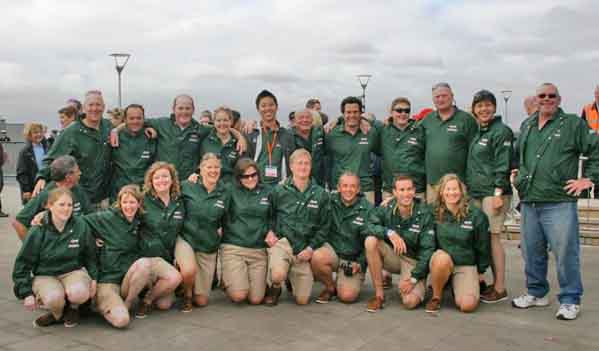
Above: the crew of Cork at the beginning of the Clipper Race 2009
Lough Swilly Yacht Club
Lough Swilly Yacht Club is based in Fahan Creek on the shores of Lough Swilly, Co Donegal, three miles from Buncrana and ten miles from Derry.
Our membership consists of IRC-racing and cruising sailors as well as powerboat enthusiasts and some keen dinghy sailors. All club members enjoy spending time pottering about on the lough and many like to venture further afield; either to cruise or to represent the club in competition (see the Ships' Blog section for more).
Club History
The Lough Swilly Yacht Club was founded in February, 1955, when a meeting took place in the old City Hotel, with a view to forming a 'club' to encourage sailing and power boating in Lough Swilly by every possible means.
The first Officers of the club were: Commodore Dr. T.E. Hastings. Vice Commodore James McColgan. Rear Commodore Stephen Faller. Secretary Mayne Elliot and Treasurer Norvall Watt. A Committee was set up of men who between them had a wealth of sailing experience and whose enthusiasm and sheer hard work laid the firm foundation of today's thriving club.
The club was fortunate to have as a founder member Mr. James Whyte, Manager of the Lough Swilly Railway Co. and when the railway line from Derry to Buncrana closed in 1953 the club was able to purchase for a very nominal sum the old station waiting room and ticket office, as well as a considerable amount of ground where the old railway line ran beside the water's edge. This formed the nucleus of the present club and in subsequent years the slipway was built and extended, the caravan site erected and the clubhouse itself took in the old station house.
The first racing took place at 3.30pm (Swilly time) on Opening Day, Saturday 2nd July 1955, and there was a fine turnout of miscellaneous craft. After the day's racing all members and friends were invited to afternoon tea at the temporary club premises on the Railway Station Platform in Fanad, durning which prizes were awarded.
(The above information and image courtesy of Lough Swilly Yacht Club.
Lough Swilly Yacht Club, c/o Karen Sleat, Fahan, Lifford, Co Donegal. Email: [email protected]



























